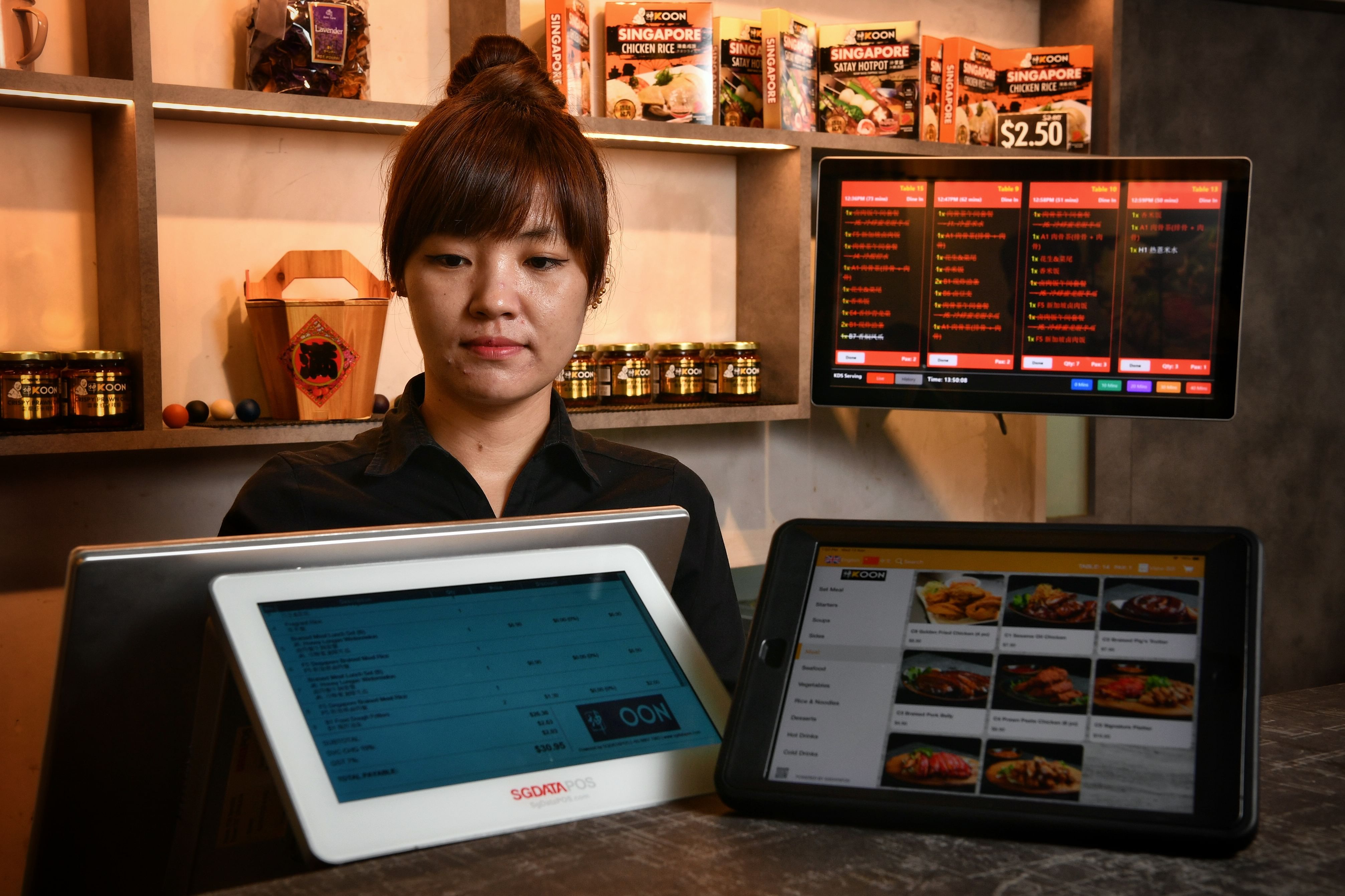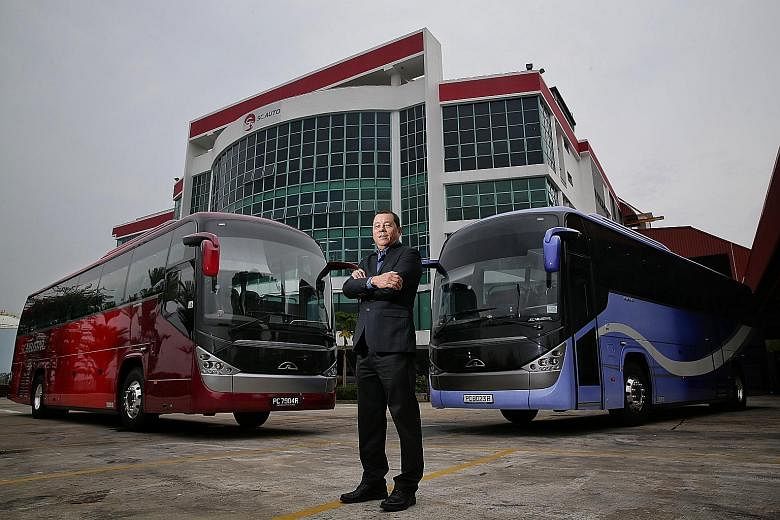Local bus manufacturer SC Auto, which embarked on a transformation journey five years ago, reached a major milestone last month when its SC Neustar buses started running on the roads in Myanmar.
This came just 10 months after the launch of the first bus to be completely built and designed in Singapore last December.
SC Auto chairman Tan Siow Chua told The Straits Times that its overseas ambitions drove it to shift from making bus parts to manufacturing its own buses.
"If we didn't change our business strategy, we would be able to operate only in Singapore, and expanding overseas would be dependent on others wanting to partner with us. But by developing our own buses, we have more freedom in deciding which markets we want to expand to," he said.
Mr Tan started the business in 1978 with a single bus, transporting students and factory workers.
In 1992, he expanded into designing and building buses, partnering global vehicle manufacturers such as Volvo and Isuzu, before incorporating SC Auto four years later as the company started to focus on bus manufacturing.
In 2014, SC Auto began building its own brand of buses. The end result: SC Neustar. It is about 1 tonne lighter than the average passenger bus, resulting in 3 per cent to 4 per cent fuel savings, despite having a luggage compartment that is about 15 per cent larger than its rivals', Mr Tan said.
Five years and $60 million into its journey, SC Auto, which has about 150 employees, now has the ability to deliver around 900 buses a year from its factories in Senoko and Yangon, Myanmar. As it went regional, it also automated the production processes at its Myanmar plant with the adoption of precision laser tube-cutting systems, which have raised productivity by up to 40 per cent.
Mr Tan said assistance from government agency Enterprise Singapore (ESG) helped SC Auto embark on its research and development (R&D) efforts.
The agency provides support for companies across industries to boost productivity, embrace innovation and internationalise their operations.
ESG chief executive Png Cheong Boon said that even amid a slowdown in the economy, businesses must continue to focus on positioning themselves for the future by putting in place plans for automation and digitalisation, while investing in skills training for their workers.
EMBRACING INNOVATION
SC Auto's experience holds lessons for businesses looking at new ways to do things or develop new products and services to differentiate themselves. This would allow them to compete based on their innovative edge rather than cost, which is not tenable in today's economy, Mr Png said.
This sentiment was shared by Mr Tan, who said it is impossible for a company in Singapore to compete with firms in the region on cost due to high labour costs here.
SC Auto's next phase of innovation focuses on a new three-axle vehicle which is larger and more stable than its existing offerings. This new vehicle, which is in the R&D phase, will be produced in Myanmar and is targeted at the South-east Asia market, Mr Tan said.
IMPROVING PRODUCTIVITY
For businesses earlier in their transformation journey, Mr Png said they can strengthen their fundamentals by improving productivity through digitalisation and automation, instead of relying on manual processes and systems.
Local eatery Koon Bak Kut Teh, which started as a hawker stall in 2005 before opening its first restaurant in 2012, upgraded its point-of-sale system, as well as its dish-washing equipment and combination ovens earlier this year.
Mr Chong Nyen Koon, founder and director of Koon, said the eatery is able to manage its manpower more effectively now. "Staff said the new systems have made their lives easier as several tasks have become simpler, with less mundane and repetitive steps," he said.
The company was given advice on how to improve its productivity at an SME Centre, where small and medium-sized enterprises (SMEs) receive free one-on-one advice.
Koon applied for several grants, which spurred its productivity push.
However, this transformation came with its challenges, Mr Chong said, citing significant costs despite receiving subsidies and grants, as systems required upgrading and staff had to be trained to implement the changes.
"It was also not easy to get employees who were used to the old systems to accept the changes," Mr Chong said. But the efforts have paid off as the eatery has boosted its productivity levels, he added.
EXPANDING OVERSEAS
Adapting to technology was no issue for medtech start-up KroniKare. Its challenge was finding the right market.
Singapore's small market means that companies should look beyond its shores and diversify the markets they go into, Mr Png said. With its networks and connections in foreign markets, ESG has been key in helping local companies establish themselves abroad.
For KroniKare, ESG helped introduce the company's artificial intelligence-based wound scanner to India's massive market.
KroniKare co-founder Ali Y. Aladdin said: "ESG has been key in helping us jump-start our operations overseas, and having ESG introduce us to (hospitals, governments and other stakeholders) gives us credibility."
In October last year, KroniKare participated in a trip to India and connected with Apollo Hospitals, a leading private hospital group in India. In April this year, KroniKare signed an agreement with Apollo which will pave the way for clinical trials.
KroniKare is also leveraging ESG's connections to set up an office in the Netherlands. The company's presence there is key to its ambitions in Europe, despite already having an office in Britain, given the Brexit situation, Mr Aladdin said.
Mr Kurt Wee, president of the Association of Small and Medium Enterprises, said ESG has helped boost the SME ecosystem in Singapore. "ESG has been crucial in supporting SMEs in their market search and business matching abroad, even up till their first or second year overseas," he added.
Mr Png said that while venturing abroad comes with challenges and risks, offerings from Singapore companies are in demand overseas, and ESG is committed to helping firms capitalise on these opportunities to expand overseas.
"For those who have already internationalised, we will continue to work with them to expand their global footprint, especially since diversification can help lower market-specific risks," he added.
Get help from Enterprise Singapore amid tough economic climate
Enterprise Singapore (ESG) chief executive Png Cheong Boon said it is important for companies to embrace change amid the tough economic climate.
They can start with workforce transformation: Redesigning job roles or implementing on-the-job training to help workers keep pace with new technologies, and redeploying workers from roles which are no longer relevant to other roles as businesses diversify or transform.
WHERE YOU CAN GO
ESG has streamlined several schemes to make them more flexible and increased the quantum of support to better cater to the different needs of companies.
Last year, the Capability Development Grant and the Global Company Partnership Grant were combined into the Enterprise Development Grant. Last month, several financing schemes were brought under one umbrella - the Enterprise Financing Scheme - to help firms access financing more readily throughout their growth stages.
Firms can also work with any of ESG's 10 Centres of Innovation. They provide technical expertise and equipment to co-develop products and services, to speed up the commercialisation of new technologies.
TALK TO EXPERTS
ESG and its partners provide several tools to help companies take the first step to increasing their productivity. These partners include trade associations and chambers, SME Centres, Centres of Innovation, institutes of higher learning and other government agencies.
Tools include:
• Business advisers from SME Centres who have been specially trained to support heartland and small enterprises on their digitalisation journeys.
• The Start Digital programme, which allows companies to adopt digital tools in payroll, marketing and accounting at no cost for at least six months if they sign on for a package with ESG's partners. This enables firms to put in place basic digital tools.
• High-growth companies can also participate in ESG's Scale-up SG programme to develop their expansion strategies with consultants and engage in peer learning or networking opportunities.
More information can be accessed at https://www.enterprisesg.gov.sg/keepgrowing
Choo Yun Ting

Faster wound diagnosis
KroniKare's wound scanner, a patented diagnostic tool for artificial intelligence-based chronic wound assessment, went on trial at Changi General Hospital and was deployed in St Andrew's Community Hospital. It reduces the time required to assess a wound from 30 minutes to 30 seconds.
The scanner is able to assess a wide variety of wounds, from ulcers to those caused by accidents, and can detect infection and blood circulation problems as well.
It also replaces people required to manually assess the wound, a process which can be invasive and error-prone.

Souping up eatery with tech
Koon Bak Kut Teh outlet manager Sun Min (above) using the eatery's point-of-sale system, which includes wall monitors that show customers' orders. Buyers at the eatery use iPads to order their food.
The upgraded point-of-sale system, along with a new digital kitchen display system, was introduced this year, allowing the eatery to automate manual tasks such as writing down orders on notebooks or shouting new orders.
The system has also made it easier for the eatery to analyse daily operations and keep track of the business' progress, which was difficult to do without being physically on site.


